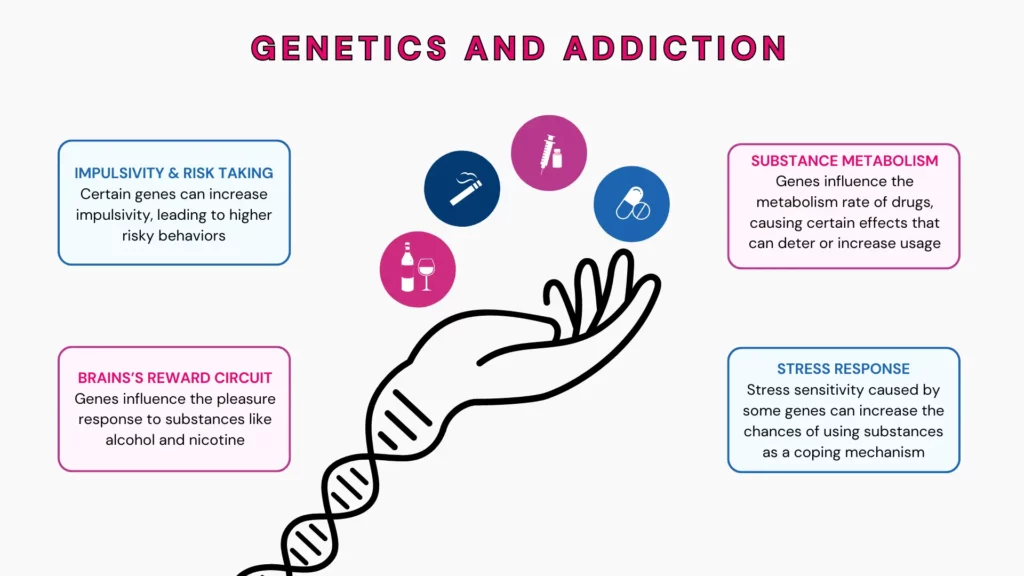What if addiction is less about the choices we make and more about the genetics we inherit? Research suggests that up to 50% of addiction risk may come from our DNA. Advances in genetic science are revealing how specific genetic variations might influence our susceptibility to addiction. This new understanding prompts us to question how much control we really have over addictive behaviors. Let's explore the connection between genetics and addiction to uncover how our genes might shape our vulnerabilities.
Is Addiction Genetic?
Addiction can be influenced by genetics, with some people inheriting a predisposition to substance use disorders (SUDs).
Substances like alcohol, tobacco, and drugs are acted upon by certain genes which influence the following:
- How drugs are metabolized in the body
- How our brain “rewards” it - pleasure response
- How we deal with stress
- How impulsive we are
Some people may have certain genes that make them enjoy the drugs more than normal.
The genes may trigger the release of certain hormones that induce pleasure response upon substance usage.
Thus, they may make a person more prone to addiction.
However, it is important to note that genetics by itself cannot cause addiction.
It works alongside other factors to determine whether someone develops addictive behaviors.
The Role Of Genes In Addiction
Various genetic factors influence how the brain processes pleasure, stress, and reward.
Some of these increase susceptibility to addictive behaviors, particularly through their impact on dopamine and reward pathways.
Some genes linked to addiction include:
- MAOA, SLC6A4, and COMT:
- Influence stress resilience and dopamine regulation.
- Variants in these genes can reduce stress-coping abilities, increasing reliance on substances or behaviors that boost dopamine levels.
- GABRA2 and CHRM2:
- Linked to alcohol use disorder (AUD).
- Variants in these genes can enhance the brain’s response to alcohol's calming effects.
- CHRNA2:
- Associated with cannabis use disorder (CUD).
- Lower expression of this gene increases the likelihood of marijuana addiction by affecting how the brain responds to nicotine-like substances.
- CUL3, PDE4B, and PTGER3:
- Connected to smoking and alcohol use.
- These genes influence brain signaling pathways that regulate addiction-related behaviors.
Is Drug Addiction Hereditary?
Drug addiction can have a hereditary component, meaning that if you have a family history of addiction, you may be more likely to face similar challenges.
How Heredity Impacts Addiction Risk
Heredity plays a crucial role in addiction, with genetic factors contributing about 50% to the likelihood of developing SUDs.
Advances in genetic research, particularly through genome-wide association studies (GWAS), reveal that many small genetic variations influence SUDs.
These variations across the genome can increase addiction risk.
Findings have pinpointed specific genes related to alcohol metabolism, such as ADH1B and ALDH2, and nicotine use, such as CHRNA5-CHRNA3-CHRNB4.
These discoveries highlight how genetic predispositions can increase vulnerability to addiction, though they do not guarantee it.
Environmental vs. Genetic Factors
A combination of genetic and environmental factors conditions addiction.
Genetics may predispose individuals to addiction, but environmental influences like stress, trauma, and peer pressure are equally important in shaping addiction risk.
However, having a supportive environment and developing healthy habits can help prevent addiction, even for those with a genetic risk.

How To Know If You Have The Addiction Gene
What is the 'Addiction Gene'?
There isn't a single "addiction gene." Instead, a combination of genetic variants may increase a person's risk of developing addictive behaviors.
These genes can influence the brain's reward system, particularly through dopamine.
Some individuals may inherit gene variants that heighten their susceptibility to addictive behaviors, making it harder to regulate impulses.
Genetic Testing for Addiction
Genetic testing can reveal details about a person's genes, including variations that might increase their risk of addiction.
These tests can identify specific genetic markers linked to addiction, helping individuals understand their potential vulnerability.
As research progresses, genetic testing is expected to become more accurate in identifying addiction risks. For now, the information from these tests allows people to assess their risk more clearly.
This understanding helps them make better lifestyle choices, seek support if needed, and take steps to reduce their risk.
Efforts like the National Institutes of Health's (NIH) Big Data to Knowledge (BD2K) program are working to improve how genetic data is used and shared.
This research aims to refine genetic testing and develop personalized treatments based on genetic profiles.
Additionally, pharmacogenetics is an emerging field that customizes medications based on an individual's genetics, potentially improving addiction treatment.
FAQs About Genetics And Addiction
How Does Family History Affect Addiction?
Research indicates that approximately 40% to 70% of an individual's susceptibility to SUD can be due to genetic factors, particularly when there is a family history of addiction. Specific genes can influence how the brain's reward system responds to substances, increasing the likelihood of developing dependence. People with a family history of alcohol abuse are up to 4 times more likely to develop problems with alcohol.
Why Do Some People Become Addicted While Others Don't?
While genetics influence addiction risk, environmental factors, such as exposure to drugs at an early age and experiences of trauma or stress, also significantly contribute to an individual's risk. Additionally, mental health issues like anxiety or depression can lead some individuals to self-medicate with substances, increasing their susceptibility to addiction. Ultimately, the interplay between these biological and environmental influences shapes each person's unique vulnerability to developing substance use disorders.
What Does Dopamine Addiction Look Like?
Dopamine addiction appears as follows:
- Sexual compulsivity: Constantly seeking sexual activities for the dopamine rush, requiring more to achieve the same level of pleasure.
- Alcohol addiction: Excessive drinking despite adverse consequences, with alcohol causing high dopamine levels and leading to tolerance.
- Chemical dependency: Inability to control drug use, with substances like cocaine flooding the brain with dopamine and creating strong dependence.
- Food-related disorders: Overeating certain foods for pleasure, driven by dopamine release, leads to a need for more food to feel satisfied.
- Technology addiction: Obsessively using digital devices and platforms, with dopamine release from activities like social media and gaming, resulting in constant usage for pleasure.
Can I Prevent Addiction If I Have A Genetic Predisposition?
Even with a genetic predisposition, you can manage addiction by taking proactive steps and seeking personalized support.
Recognizing your triggers and developing strategies to handle them are crucial to lowering your risk.
Several ways to prevent and manage addiction include:
- Awareness and education: Understanding how genetics play a role in addiction helps you recognize risk factors early and take action to manage or avoid them.
- Proactive measures: Avoiding harmful habits during tough times can be achieved by:
- Practicing stress management techniques
- Using mindfulness
- Staying engaged in healthy activities like exercise
- Personalized treatment: Specialized programs can be essential in managing addiction, including:
- Behavioral therapies: Cognitive-behavioral therapy (CBT) can help shift negative thought patterns, while motivational interviewing (MI) can help boost your commitment to recovery.
- Medications: Managing withdrawal and preventing a return to old habits can be achieved with the right medicine. Testing your genes helps doctors identify the best treatment with fewer side effects.
- Support systems: A strong network, including groups like Alcoholics Anonymous (AA) or Narcotics Anonymous (NA), can provide constant support and understanding.
What Are The Signs Of A Genetic Predisposition To Addiction?
Signs of a genetic predisposition to addiction include:
- Family history of addiction
- Developing addictive behaviors at a young age, possibly due to genetic factors
- Difficulty quitting addictive substances or behaviors despite harmful effects
- Needing more of a substance to feel its effects
- Having mental health issues like schizophrenia, major depression, or personality disorders, which are often linked to addiction
Summary: Is Addiction Genetic?
- Genetics can influence addiction risk by affecting how the brain processes pleasure and stress.
- There isn't a single "addiction gene"; instead, multiple genetic variations contribute to addiction susceptibility.
- Inherited genetic factors from a family history of addiction can raise the risk of becoming addicted.
- Environmental factors like stress and peer influence interact with genetic predisposition to shape addiction risk.
- Genetic testing can provide insights into potential addiction risk but is not a definitive predictor.
- Ongoing research and pharmacogenetics aim to personalize addiction treatment based on genetic profiles.
- Managing addiction involves proactive strategies such as stress management, behavioral therapies, and addressing both genetic and environmental factors.
Expert-recommended Picks For You

Gambling Addiction Likely In The Genes, Study Says

How Genes Influence Impulsivity And Risk-taking Behavior

The Genetics Of Alcohol Dependence
References
https://health.clevelandclinic.org/is-addiction-genetic
https://americanaddictioncenters.org/rehab-guide/addiction-genetic
https://www.ncbi.nlm.nih.gov/pmc/articles/PMC8477224
https://learn.genetics.utah.edu/content/addiction/genes
https://nida.nih.gov/publications/drugfacts/understanding-drug-use-addiction
https://www.verywellmind.com/can-you-get-addicted-to-dopamine-5207433





